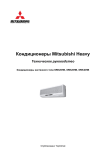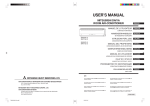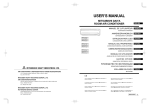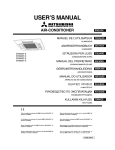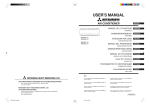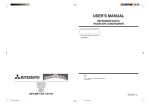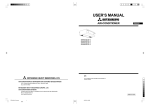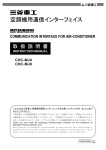Download Mitsubishi Daiya SRK28HB User`s manual
Transcript
USER’S MANUAL MITSUBISHI DAIYA ROOM AIR CONDITIONER ENGLISH MANUEL DE L’UTILISATEUR FRANÇAIS CLIMATISEUR D’INTERIEUR ANWENDERHANDBUCH DEUTSCH KLIMAGERÄT ISTRUZIONI PER L’USO ITALIANO CONDIZIONATORE D’ARIA PER AMBIENTI MANUAL DEL PROPIETARIO SRK20HB SRK28HB SRK40HB ESPAÑOL ACONDICIONADOR AMBIENTAL DE AIRE GEBRUIKERSHANDLEIDING NEDERLANDS KAMER-AIR-CONDITIONING MANUAL DO UTILIZADOR PORTUGUÊS APARELHO DE AR CONDICIONADO DE INTERIOR √¢∏°π∂™ Ã∏™∏™ ∂§§∏¡π∫∞ ∫§πª∞∆π™∆π∫√ ∂™ø∆∂ƒπ∫√À Ãøƒ√À РУКОВОДСТВО ПО ЭКСПЛУАТАЦИИ РУССКИЙ КОМНАТНЫЙ КОНДИЦИОНЕР ВОЗДУХА KULLANIM KILAVUZU TÜRKÇE SPL‹T KL‹MA This air conditioner complies with EMC Directive 89/336/EEC, LV Directive 73/23/EEC. Este acondicionador de aire cumple con la directiva EMC: 89/ 336/EEC, LV Directiva 73/23/EEC. Ce climatiseur est conforme à la Directive EMC: 89/336/EEC, LV Directive 73/23/EEC. Deze airconditioner voldoet aan EMC Directive 89/336/EEC, LV Directive 73/23/EEC. Dieses Kimagerät erfüllt die EMC Direktiven 89/336/EEC, LV Direktiven 73/23/EEC. Este aparelho de ar condicionado está em conformidade com a Directiva EMC 88/336/CEE e a Directiva LV 72/23/CEE. Questo condizionatore d’aria è conforme alla Direttiva EMC: 89/ 336/EEC, LV Direttiva 73/23/EEC. ∞˘Ùfi ÙÔ ÎÏÈÌ·ÙÈÛÙÈÎfi Â›Ó·È Û‡ÌʈÓÔ Ì ÙȘ ÚԉȷÁڷʤ˜ Ù˘ √‰ËÁ›·˜ EMC 88/396 Î·È Ù˘ √‰ËÁ›·˜ LV 73/23 Ù˘ ∂√∫. RMA012A008 RMA012A008A_COVER 1 05.2.4, 11:31 A Thank you for purchasing a Mitsubishi Daiya Air Conditioner. To get the best long-lasting performance, read and follow this User’s Manual carefully before using your air conditioner. After reading, please store the Manual in a safe place and refer to it for operational questions or in the event of any irregularities. This air conditioner is intended for domestic use. This instruction manual contains the explanation of the heatpump air-conditioner. That of cooling-only air-conditioner shall be referred to the same explanation , with neglecting the information on heating-operation mode. Contents Safety Precautions ........................................................................................................................ 2 Choice of operation and features .................................................................................................. 4 Name of each part and its function ............................................................................................... 5 Operation and indication section for remote control .................................................................... 7 AUTO mode operation procedure ................................................................................................ 8 Temperature adjustment during AUTO ........................................................................................ 8 COOL/HEAT/DRY/FAN mode operation procedure .................................................................. 9 Adjustment of airflow ................................................................................................................... 9 Emergency operation .................................................................................................................. 10 OFF-TIMER operation procedure .............................................................................................. 11 ON-TIMER operation procedure................................................................................................ 11 About Timer operation ............................................................................................................... 12 About FAN (circulator) mode procedure ................................................................................... 12 About FAN SPEED .................................................................................................................... 12 Remote control handling procedure ........................................................................................... 12 Warning note for remote control handling ................................................................................. 13 Operating hints ........................................................................................................................... 13 Maintenance................................................................................................................................ 14 Has the unit been installed correctly? ......................................................................................... 15 Troubleshooting .......................................................................................................................... 15 Please remember! ....................................................................................................................... 16 When to contact your distributor without delay ......................................................................... 17 Characteristics of HEAT mode operation .................................................................................. 17 Self diagnosis function ............................................................................................................... 17 –1– P.1-18/E 1 04.10.19, 10:26 AM ENGLISH SAFETY PRECAUTIONS • • • Before starting to use the system, please read these “SAFETY PRECAUTIONS” carefully to ensure proper operation of the system. The safety precautions are classified as “ DANGER” and “ CAUTION”. Precautions as shown in the column “ DANGER” indicate that improper handling could have dramatic consequences like death, serious injury, etc. Nevertheless, even precautions as shown in the column “ CAUTION” might pose a serious problem, depending on the circumstances. Please observe these precautions with great care, since they are essential to your safety. Symbols which appear frequently in the text have the following meaning: Strictly prohibited • Observe instructions with great care Provide positive earthing When you have read the instruction manual, please keep it near at hand for consultation. If someone else takes over as operator, make certain that the manual is also passed on to the new operator. ❚ INSTALLATION PRECAUTIONS DANGER The system is meant for domestic, residential etc. use. The system must be installed by your dealer or a qualified professional. If used in inferior environments, such as an engineering workplace, the equipment may function poorly. It is not advisable to install the system yourself, as faulty handling may cause leakage of water, electric shock or fire. CAUTION Do not install near places where inflammable gas may leak. Depending on the place of installation, a circuit breaker may be necessary. LPG Gas leaks may cause fire. If you don’t fit a circuit breaker, you may cause an electric shock. Make sure that you drain the hose properly, so that all the water has dripped out. Make sure that the system has been properly earthed. Negligence may cause flooding in the room resulting in wet furniture. Earth cables should never be connected to a gas pipe, municipal water pipe, lightning conductor or telephone earth cable. Incorrect installation of the earth cable may produce an electric shock. ❚ OPERATION PRECAUTIONS DANGER Do not expose yourself to the cooling air for prolonged periods. Do not insert anything into the air inlet. This could affect your physical condition and cause health problems. This may cause injury, as the internal fan rotates at high speed. –2– P.1-18/E 2 04.10.19, 10:26 AM SAFETY PRECAUTIONS CAUTION Only use approved fuses. Do not handle the switches with wet hands. Don’t swing from the system. Use of steel or copper wire instead of an approved fuse is strictly forbidden, as it may cause a breakdown or fire. This may cause an electric shock. If the system falls down, you may get injured Do not place a combustible insecticide or paint spray near the blower, nor aim it directly at the system. You should not expose any combustion appliance directly to the air stream of the air conditioner. Do not wash the air conditioner with water. This may result in a fire. The appliance may then work inadequately. This could cause an electric shock. The system should only be used for its original purpose and not for anything else like, for instance, preservation of food, plants or animals, precision devices or works of art. Do not place anything containing water, like vases, on top of the unit. Do not install the system at a place where the air stream of the blower is aimed directly at plants or animals. The system is only intended for use in ordinary domestic rooms. Any other use of the system may damage the quality of food, etc. Water entering the unit could damage the insulation and therefore cause an electric shock. This will damage their health. Do not sit on the outdoor unit nor put anything on it. After a long period of use, check the unit's support structure from time to time. When you clean the system, stop the unit and turn off the power switch. If the unit falls down or things drop off it, people could get hurt. If you don't repair any damage straightaway, the unit may fall down and cause personal injury. Never clean the unit while the internal fan is rotating. If you operate the system together with a combustion appliance, you must regularly ventilate the indoor air. Insufficient ventilation may cause accidents due to oxygen deficiency. ❚ PRECAUTIONS FOR TRANSFER OR REPAIRS DANGER Consult your dealer for repairs to the system. If the air conditioner is moved elsewhere, contact your dealer or a professional fitter. If you notice anything abnormal (smell of burning, etc.), stop the system, turn off the power switch and consult your dealer. Wrong repairs could cause an electric shock, fire, etc. Faulty installation may cause water leakage, electric shock, fire, etc. Continued use of the system in abnormal circumstances may result in malfunctioning, electric shock, fire, etc. –3– P.1-18/E 3 04.10.19, 10:26 AM Choice of operations and features Choise of operations HEAT Page 9 The unit draws in heat from the outside air, transfers it inside and heats the room. Page 9 COOL Cooling by extracting heat from the room. DRY Page 9 Drying by extracting damp from the room. Functioning of micro computer depends on setting and room temperatures. It dehumidifies while keeping room temperature almost constant. FAN Page 9 Fanning by circulating room air. Page 8 AUTO Automatic selection of operating mode. The Auto mode automatically selects the operation mode (HEAT, COOL or DRY), depending on the room temperature when switched on. When stove or other heating equipment is in use, switch on fan for efficiency Characteristics Amenity facility Page 12 When using the timer to switch on, the system become operational shortly before the set time, depending on the room temperature so that the desired temperature is reached at the set time. Adjustment of airflow Page 11 TIMER procedure There are two timers, for ON and OFF. They can be set as desired. Page 9 • AUTO This function sets the unit at the most suitable angle for blowing, imitating a natural breeze. • MEMORY FLAP Once the flap position has been set, the unit will memorise it and continue in the same position the next time. –4– P.1-18/E 4 04.10.19, 10:26 AM Name of each part and its function INDOOR UNIT Air inlet grille Draws in the indoor air. Room temperature detector Unit operation section Unit indication section and remote control signal receiver Air filter Removes dust or dirt from the inlet air. Page 14 Air outlet Air blows out of here. Left/right air flow adjustment fin Page 10 Drain hose Drains water from the dehumidified air. Wireless remote control Page 7 Up/down air flow direction adjustment flap Page 9 Refrigerant piping connection electric flex OUTDOOR UNIT SRC20 SRC28 SRC40 Air inlet (on side & rear surface) Air outlet –5– P.1-18/E 5 04.10.19, 10:26 AM Unit indication section RUN (HOT KEEP) light (green) • Illuminates during operation. • Blinks at air flow stop due to the ‘HOT KEEP’. RUN TIMER Page 16 TIMER light (yellow) Illuminates during TIMER operation. How to close the suction grill How to open the suction grill Push both sides evenly and press further lightly at the center. Place fingers at the recesses on both sides of the grill and pull up the grill to this side so that it will be opened by about 60 degrees. ON/OFF Unit ON/OFF button Removal, installation of suction grill In emergencies, this button can be used for turning on/off the unit when remote control is not available. When removing the suction grill for internal cleaning or others, open the grill by 90 degrees and then pull it to this side. Page 10 Grill When installing the suction grill, securely engage the mounting arms of the grill with the main unit and close the grill. Mounting arm –6– RMA012A008A_En_P1-18 6 05.2.4, 11:35 Operation and indication section for remote control Operation section OPERATION MODE select button Each time the button is pushed, the ¡ indicator is switched over in turn. CONT AUTO HI MED LO ON/OFF button Press for starting operation, press again for stopping. FAN SPEED button ON OFF TIMER FAN SPEED Each time the button is pushed, the ¡ indicator is switched over in turn. ON/OFF AIRFLOW button MODE This button changes the flap mode. When pressed, this button changes the mode in the following order: TEMP AIR FLOW or TEMPERATURE button (AUTO) SET TIMER This button sets the room temperature. TIMER (SWING) no indication (SWING STOPPED) Page 9 ACL TIMER button This button changes the selection of ON timer/OFF timer operation and normal operation. Page 11 TIMER TIME button This button sets the ON timer and OFF timer times. Page 11 RESET switch Switch for resetting microcomputer. Page 12 Indication section • The above illustration shows all controls, but in practice only the relevant parts are shown. S Heat Pump model OPERATION MODE Indicator TEMPERATURE Indicator Indicates selected operation with¡lamp. Indicates set temperature. (Does not indicate temperature when operation mode is on AUTO) CONT AUTO HI MED LO [ (Auto) • (Cool) • (Heat) • (Dry)] + – AIR FLOW Indicator ON OFF TIMER Shows selected flap mode. FAN SPEED Indicator TIMER Indicator Indicates set air flow rate with¡lamp. S Cooling Only model OPERATION MODE Indicator TEMPERATURE Indicator Indicates selected operation with¡lamp. Indicates set temperature. (Does not indicate temperature when operation mode is on AUTO) CONT AUTO HI MED LO [ (Auto) • (Cool) • (Fan) • + – AIR FLOW Indicator ON OFF TIMER Shows selected flap mode. FAN SPEED Indicator TIMER Indicator Indicates set air flow rate with¡lamp. Transmission procedure When each button on the remote control is pressed – with the remote control pointing towards the air conditioner unit – a signal is transmitted. When the signal is received correctly, the unit will beep. –7– P.1-18/E 7 04.10.19, 10:26 AM (Dry)] AUTO mode operation procedure ■ Automatically selects the operation mode (HEAT, DRY, COOL) depending on the room temperature when switched on. Aim the remote control at the air conditioner 1 2 CONT AUTO HI MED LO + – ON OFF TIMER FAN SPEED ON/OFF MODE TEMP AIR FLOW SET TIMER TIMER Press the ON/OFF button When the unit is not in AUTO mode: Press MODE button. Move the [¡mark] to the To stop: (Auto) position. Press the ON/OFF button. ACL AUTO mode can be operated by simply pressing the ON/OFF button. NOTE Air is not blowing out during the operation. Air flow direction adjustment procedure • If you don't want the AUTO mode programme, change to HEAT, DRY or COOL instead of AUTO. Page 16 Page 9 Page 9 Temperature adjustment during AUTO Air temperature adjustment is possible even during automatic operation. There are 6 levels of adjustment possible with the button or the CONT AUTO HI MED LO + – ON OFF TIMER FAN SPEED ON/OFF MODE TEMP AIR FLOW SET TIMER TIMER ACL WARM Press the button. COOL Press the button. When a change in temperature is desired. 1 Press the or button ■ Each time the button is pushed, the switch over occurs in the following order –6 → –5 → ............ –1 → ±0 → +1 ............ +6. When +6 is indicatored, even if the button is pushed, the indicator does not change. ■ Each time the button is pushed, the switch over occurs in the following order +6 → +5 → ............ +1 → ±0 → –1 ............ –6. When –6 is indicatored, even if the button is pushed, the indicator does not change. –8– P.1-18/E 8 04.10.19, 10:26 AM button. COOL /HEAT/DRY/FAN mode operation procedure Aim the remote control at the air conditioner 1 2 CONT AUTO HI MED LO ON OFF TIMER MODE TEMP AIR FLOW SET TIMER TIMER 3 ACL Heat Pump model: (Cool), (Heat), Cool Only model: (Cool), (Fan), (Dry) (Dry) Press the TEMP button Press or button for the desired temperature. Standard 26°C~28°C 21°C~24°C FAN HEAT ON/OFF Press the MODE select button Move the [¡mark] to the desirable operation position. DRY COOL FAN SPEED Press the ON/OFF button 22°C~24°C —— • If CONT is selected, the room temperature is not controlled, as the operation is then continuous. Air flow direction adjustment procedure. 4 Page 9 Press the FAN SPEED button Set the air flow rate as desired. NOTE To stop: Press the ON/OFF button. • The air is not blown out during the operation. Program changing procedure Set the new program • The operation program can also be set or changed when the air conditioner is not in operation. Page 16 Air flow direction adjustment procedure Adjusting up/down air flow direction ■ Up/down direction can be adjusted with the AIRFLOW button on the remote control. Each time when you press this button the mode changes as follows: No indication (flap stopped) or (AUTO) (SWING) Change to AIRFLOW mode. AUTO SWING FLAP In COOL, DRY and FAN operation Stops at the level position for one minute. Sway operation In HEAT operation Sway operation Flap moves up and down continuously The flap operation as shown above will be repeated. The flap operation as shown above will be repeated. NOTE • If the room temperature control (thermostat) switches to the heating mode or if the defrosting operation is on, the blow flap changes automatically to a horizontal position. • If the heating operation has just started and the room temperature is still low, it may take a while before the flap moves to the above sway operation angle. • The flap may stop at the tilted down-blow position during the “sway operation” in the heating mode. –9– P.1-18/E 9 04.10.19, 10:27 AM AIRFLOW DIRECTION ADJUSTMENT PROCEDURE Adjusting left/right air flow direction MEMORY FLAP (FLAP STOPPED) When you press the AIRFLOW button once while the flap is operating, it stops swinging at an angle.Since this angle is memorized in the micro-computer, the flap will automatically be set at this angle when the next operation is started. • Recommended angle of the flap when stopping (Slant forward blowing) HEAT • • • Adjust the direction by moving the left/right air flow fin by hand. (Horizontal blowing) COOL, DRY DANGER Avoid constant airflow to the body for hours on end. CAUTION Avoid downward blowing operation for hours on end. Do not try to adjust the flaps by hand, as the control angle may change or the flap may not close properly. CAUTION Please stop the air conditioner when adjusting the air flow direction. Emergency run operation • The ON/OFF button on the unit operates ON/OFF temporarily when the remote control is not used. Operation program • • OPERATION MODE : AUTO • FAN SPEED : AUTO • AIR FLOW : AUTO Operation starts by pressing the ON/OFF button; it stops if you press the button again. ON/OFF Unit ON/OFF button – 10 – P.1-18/E 10 04.10.19, 10:27 AM OFF-TIMER operation procedure ■ The unit stops automatically at the end of the set period of time. The room temperature is automatically controlled when the set time lapses, so that the room does not become too cold during cooling or too warm during Page 12 heating. Example: You wish it to stop after 7 hours. If the air conditioner is not operating, aim the remote control at the air conditioner. 1 2 CONT AUTO HI MED LO ON OFF TIMER FAN SPEED ON/OFF MODE TEMP AIR FLOW SET TIMER TIMER Press the ON/OFF button. Press the TIMER button. Each time the button is pressed, the indicatior is switched in the order of: No indication Set at 3 ACL . Press the TIMER TIME button. Each time the button is pressed, the indicator is switched in the order of: 12 → 11 → 10 ............ 2 → 1. button is pressed, the indicator is switched in the order of: Each time the 1 → 2 → 3 ............ 11 → 12. Set at 7. The timer light (yellow) is on. • ⇓ The unit stops at the end of the set period of time. NOTE Changing of set time Set a new time by using the TIMER TIME button. Depending on the temperature, the operation may be stopped earlier than the set time. Releasing procedure Press the TIMER button to turn off the timer indicator. ON-TIMER operation procedure ■ If the room temperature is at near optimum temperature at the set time, the operation starts 5 to 60 minutes before the set time. Page 12 Example: In the case you wish to bring the temperature to nearly set temperature in 8 hours. 1 2 CONT AUTO HI MED LO ON OFF TIMER FAN SPEED ON/OFF MODE TEMP AIR FLOW SET TIMER TIMER Press the ON/OFF button. Press the TIMER button. Each time the button is pressed, the indicatior is switched in the order of: No indication Set at 3 ACL . Press the TIMER TIME button. Each time the button is pressed, the indicator is switched in the order of: 12 → 11 → 10 ............ 2 → 1. button is pressed, the indicator is switched in the order of: Each time the 1 → 2 → 3 ............ 11 → 12. Set at 8. The timer light (yellow) is on. • • ⇓ Operation starts 5 to 60 minutes before the set time. The TIMER light goes out at the set time. Releasing procedure Changing of set time Set a new time by using the TIMER TIME button. Press the TIMER button to turn off the timer indicator. – 11 – P.1-18/E 11 04.10.19, 10:27 AM About TIMER operation About OFF-TIMER Operation About Amenity facilities Amenity facilities enable to start the operation a little earlier, so that the room approaches optimum temperature at ON time when the operation is started by ON-TIMER. • • ▼ ▼ Mechanism In COOL operation The room temperature is checked 60 minutes before the timer is at ON. (Stop) Operation starts Depending on the temperature at that (Operation) time, the operation starts 5 to 60 Set temperature minutes before the timer is at ON. • • • The Amenity facility only functions for COOL and HEAT operation mode (including AUTO). It does not work for DRY and FAN mode. Check the room temp. 60 mins. in advance. Set time • When OFF-TIMER operation is selected, the room temperature is automatically controlled after a while, ensuring that the room is not too cold during cooling or too warm during heating. During COOL and DRY: the pre-set temperature is raised by 0.5°C at the start of OFF-TIMER operation (when the timer is set). After that, the temperature goes up by 0.5°C every 30 minutes to become 1.5°C higher within one hour. During heating: Preset temperature is lowered by 1°C at the start of OFFTIMER operation (when the timer is set). After that the temperature is lowered by 1°C every 30 minutes to become 3°C lower in an hour and 10°C lower in two hours. After the OFF-TIMER operation has been conducted for 2 hours, the operation may be stopped earlier than the set time depending on the temperature condition at that time. After the OFF-TIMER operation has been conducted for 2 hours, the unit is operated with the LOW air flow. About FAN (circulator) mode operation • When the room is being heated by a stove or otherwise, use the circulator for more efficiency. If the room is warmer than the set temperature, the unit switches to FAN, and stops again when the set temperature is reached. FAN starts again when the room reaches the set temperature plus 2°C. • FAN operation continues if set to continuous. About FAN SPEED ■ You can choose the capacity of your air conditioner when heating or cooling. Operation capacity by your choice Set automatically by microcomputer Powerful operation with high capacity Standard operation Energy-saving operation FAN SPEED AUTO HI MED LO Remote control handling procedure Replacing the batteries The following cases signify exhausted batteries. Replace old batteries with new ones. • • Receiving beep is not emitted when a signal is transmitted. Indicator fades away. 1 2 Remove back lid and take out old batteries ■ When the indicator shows any abnormal condition, Press the reset switch with the tip of a ballpoint pen. The remote control can be attached to a wall or pillar by using a remote control holder. Before installing the remote control, check that the air conditioner receives the signals properly. Insert new batteries (SUM-4 or R03x2) Attention to the + and – marks Using the remote control holder NOTE • Don't use old and new batteries together. • Remove the batteries when the remote control is not used for a long period. • The life of a battery conforming to JIS or IEC is 6 to 12 months with normal use. If used longer, or when an unspecified battery is used, liquid may leak from the battery, causing the remote control to malfunction. 3 • On the battery is printed its expected life. This may be shorter than that of the air conditioner, depending on the date of manufacture. • However, the battery may still be in working order after expiry of its nominal life. Close back lid For installing or removing the remote control, move it up or down in the holder. – 12 – P.1-18/E 12 04.10.19, 10:27 AM Warning note for remote control handling • Don’t go near high temperature places, such as an electric carpet or stove. • Don’t leave the remote control • Don’t put any obstructing obstacles • Don’t spill water etc on the remote exposed to direct sunlight or other strong lighting. between the remote control and the unit. control. • Don’t drop the remote control. Handle with care. • Don’t put any weight on the remote control. When the operation fails with the remote control • Are the batteries running down? • Page 12 Replace the batteries with new ones and repeat the operation. If the operation still fails, handle as per emergency run operation. Page 10 Contact your dealer. Operating hints ■ Please observe the following for the most economic and comfortable use of your unit. Clean the filters frequently. Avoid direct sunlight and draught. Excessively high or low temperatures are not good for your health and waste electricity. Clogged filters may block the air flow and cause less efficient operation. Cut out direct sunlight by drawing the curtains or blinds when cooling. Keep windows and doors shut, except when ventilating. Adjust the airflow direction properly. Operate the unit only when needed. Generate little heat when cooling. Adjust the up/down and left/right airflow to ensure a steady room temperature. Use the timer properly to operate the unit only when needed. Keep heat sources out of the room as much as possible. Set a suitable room temperature suitable temperature – 13 – P.1-18/E 13 04.10.19, 10:27 AM Maintenance Before maintenance During the operational season Cleaning the air filter Turn off the power switch. 1 Standard interval is once every two week Remove the air filter q Pull up to this side the suction grill. w Lightly hold the knobs at both sides and lift a little to remove the grill to this side. Don’t spill water. 2 There's a danger of electric shock. If the filter is very dirty, clean it with warm water (approx. 30°C), and dry it thoroughly. 3 Don’t use the following articles: • Hot water (40°C or more) It may deform or discolour the unit. Petrol, paint thinner, benzine or polishing agents, etc. They may deform or scratch the unit. NOTE CAUTION Don’t clean the filters with boiling water Don’t dry them over an open flame. Pull them out gently • • • Wipe the unit with a soft, dry cloth. • Cleaning • • Reinstall the air filter Holding firmly the filter at both sides as shown at right and insert securely. Operating without putting back the air filters will make the unit dusty, and may cause damage. Cleaning the unit • Wipe the unit with a soft, dry cloth, or use a vacuum cleaner. • If the unit is very dirty, wipe it with a cloth soaked in warm water. Cooling/heating is affected by an air filter clogged up with dust etc., and the operation noise becomes louder. It may also use extra electricity. Please clean the air filter at appropriate intervals. At the beginning of the season At the end of the season 1 Set the temperature switch to continuous and operate FAN mode for half a day. 1 Make certain that there are no obstacles blocking the air flow around the air intake and outlet openings of the indoor and outdoor units. Dry the inside of the unit. 2 Stop the unit and turn off the power switch. The unit uses appr. 5W even when the power switch has been turned off during the off-season for safety or for saving energy. 3 4 5 Clean and reinstall the air filters. 2 Check the installation base for corrosion or rust. 3 Ensure that nothing has snapped and that the earthed flex is not disconnected. 4 Ensure that the air filters are clean. 5 Turn on the power switch. 6 Insert batteries in the remote control. Clean both the indoor and outdoor units. Remove batteries from the remote control. – 14 – P.1-18/E 14 04.10.19, 10:27 AM Has the unit been installed correctly? Suitable installation position • • • • • Is there any obstruction in front of the indoor unit, preventing proper ventilation and functioning? Don’t install the unit in any of the following places: • Where there is a danger of leaking inflammable gases. • Where there is substantial splashing of oil. Malfunctioning due to corrosion may occur if the unit is installed in a spa where sulfide gases are generated, or in a seaside resort exposed to sea breezes. Contact your dealer. The air conditioner and remote control must be at least 1 metre away from a TV set or radio. Drain the dehumidified liquid from the indoor unit into a spot that drains well. Pay attention to operating noises! • • • • When you install the unit, take care to choose a place that can comfortably stand the weight of the unit and does not increase the operating noise or vibration. If there is any likelihood that vibration may be transmitted through the house, fix the unit with the aid of vibration-proof pads between the unit and the fittings. Select a place where cold or hot air and operation noises from the indoor and outdoor units do not cause any inconvenience to your neighbours. Do not leave any obstacles near the outlet and inlet of the outdoor unit. This may cause malfunctioning and increased operating noise. If you hear an irregular noise during operation, contact your dealer. Inspection and maintenance Dependent upon service conditions and operating environment, the inside of the air conditioner may become dirty after a number of seasons' service (3 to 5 years). This will reduce performance. In addition to normal cleaning, we would recommend inspection and maintenance. (The air conditioner has a longer life without any trouble.) • • • Contact your dealer, or any distributor, for inspection and maintenance. (There will be a charge for this service). We would recommend inspection and maintenance to be carried out during the off-season. If the supply cord of this appliance is damaged, it must only be replaced by a repair shop appointed by the manufacturer, because special purpose tools are required. Troubleshooting Please carry out the following checks before making a service call. Room temperature cannot be controlled (too cold) The air conditioner does not work at all. Has the power switch been turned off? Has the timer been set in the "ON" position? Is there a power failure or a blown fuse? Has the room temperature been set to “CONT”? CONT AUTO HI MED LO ON OFF TIMER FAN SPEED ON/OFF MODE Poor cooling or heating Have you set the thermostat at a suitable temperature? Is the air filter clean? (Not clogged?) Did you leave any doors or windows open? In the “CONT” mode, the unit operates continuously, irrespective of the room temperature. suitable temperature Poor cooling Is there any direct sunlight entering the room? Is there a heat source in the room? Are there too many people in the room? If the air conditioner does not operate properly after you have checked the above points, or if any doubt still exists after you have consulted page 16, or if things happen as shown on page 17, switch off the power and contact your dealer. – 15 – P.1-18/E 15 04.10.19, 10:27 AM Please remember! You cannot restart the unit immediately after you have stopped it. Restarting has been blocked for 3 minutes after you have stopped, to protect the unit. (RUN light is on) Please wait for three minutes. Not operating? The three-minute protection timer in the microcomputer automatically starts up again. This function is not activated if you have disconnected the power. Air is not blown out when starting the HEATING operation. RUN light blinks slowly (1.5 sec ON, 0.5 sec OFF) Air is not blown out for 5 to 10 min. at HEATING operation. RUN light blinks slowly (1.5 sec ON, 0.5 sec OFF) Air is not blown out when starting the DRY operation. (RUN light is on) Air flow has stopped to prevent blowing out of cold air until the indoor heat exchanger has warmed up (2 to 5 min.) (HOT KEEP) When outdoor temperature is low and humidity is high, the unit sometimes performs defrosting automatically. Please wait. During defrosting, water or steam may escape from the outdoor unit. The indoor fan may stop to prevent re-evaporation of dehumified moisture and to save energy. Some steam escapes during COOL operation This may occur if the room's temperature and humidity are very high. It disappears as soon as the temperature and humidity decrease. There is a slight smell Air blown out during operation may smell. This is caused by tobacco or cosmetics sticking to the unit. You hear a slight gurgling sound This is caused by refrigerating liquid moving within the unit. You hear a slight cracking sound. This is caused by heat expansion or contraction. After a power cut or disconnection of the power plug, you cannot re-start, even if power has been restored. The memory circuit of the microcomputer has been wiped out. Use the remote control to start the operation again Remote control signals are not received. Remote control signals may not be received if the signal receiver on the air conditioner is exposed to direct sunlight or other bright light. If so, cut out the sunlight or reduce the other light. Moisture may form on the air outlet grilles. If the unit is operated for a long time in high humidity, moisture may form on the air outlet grilles and start dripping. – 16 – P.1-18/E 16 04.10.19, 10:27 AM When to contact your distributor without delay Turn off the power switch immediately and inform your dealer in any of the following situations: The fuse or switch blows continuously. The cable becomes extremely hot. The covering of the cable is cracked. A switch does not activate properly. You hear a strange noise during operation. Fuse often blows The TV, radio or other equipment starts to malfunction. When faulty movement is observed when the ON/OFF button is pressed, even after pulling out the power plug and restarting the operation after 3 minutes, the faulty movement does not disappear. The RUN and TIMER lights on the unit indication section blink quickly (0.5 secs. ON; 0.5 secs. OFF) and don't work. 3 minutes go by, but, why ... Characteristics of HEAT mode operation Mechanism and capacity of HEAT mode operation ■ Mechanism • The unit draws in heat from the cold outside air, transfers it indoors and heats the room. The heating capacity of the heat pump mechanism decreases when the outside air temperature gets colder. • The hot air circulation system takes a while before warming up the room temperature. • If the outside temperature becomes extremely low, it would be better to use an additional source of heating. Defrosting If the outside temperature becomes low and humidity is high, the heat exchanger in the outdoor unit may frost over, which prevents efficient heating. If this happens, the automatic defroster is activated and during defrosting the heating operation stops for 5 to 10 minutes. • Both indoor and outdoor fans stop and the RUN light (green) blinks slowly (1.5 secs. ON, 0.5 secs OFF) during defrosting. • The outdoor unit may give off some steam during defrosting. This is to help the defrosting process and is not a defect. • The HEAT operation resumes as soon as defrosting has been completed. Self diagnosis function ■ We are constantly trying to improve our customer service by installing checking devices that show the type of irregularity of each function as follows: RUN light Nature of defect Place of defect ➩ • Heat exchange sensor short-circuited Blinking (once/8 secs.) Irregularity of heat exchange sensor Blinking (twice/8 secs.) Irregularity of room temperature sensor Blinking (6 times/8 secs.) Indoor fan motor error • Faulty connection in the connector • Room temperature sensor short-circuited TIMER light comes on • Faulty connection in the connector • Defective fan motor • Defective printed circuit board TIMER light ➩ RUN light comes on Blinking (5 times/8 secs.) Irregularity of outdoor unit • Compressor is defective • Lack of oil • Capacitor is defective – 17 – P.1-18/E 17 04.10.19, 10:27 AM MEMO – 18 – P.1-18/E 18 04.10.19, 10:27 AM HEAD OFFICE: Air-Conditioning & Refrigeration Systems Headquarters 3-1, Asahimachi, Nishibiwajima-cho, Nishikasugai-gun, Aichi-pref., 452-8561, Japan Fax: (052) 504-7470 MHI Equipment Europe B.V. Air Conditioner Division: Damsluisweg 2, 1332 EC Almere, The Netherlands Phone: 036-5388382 Fax: 036-5325588 RMA012A008A_COVER 2 05.2.4, 11:31




















